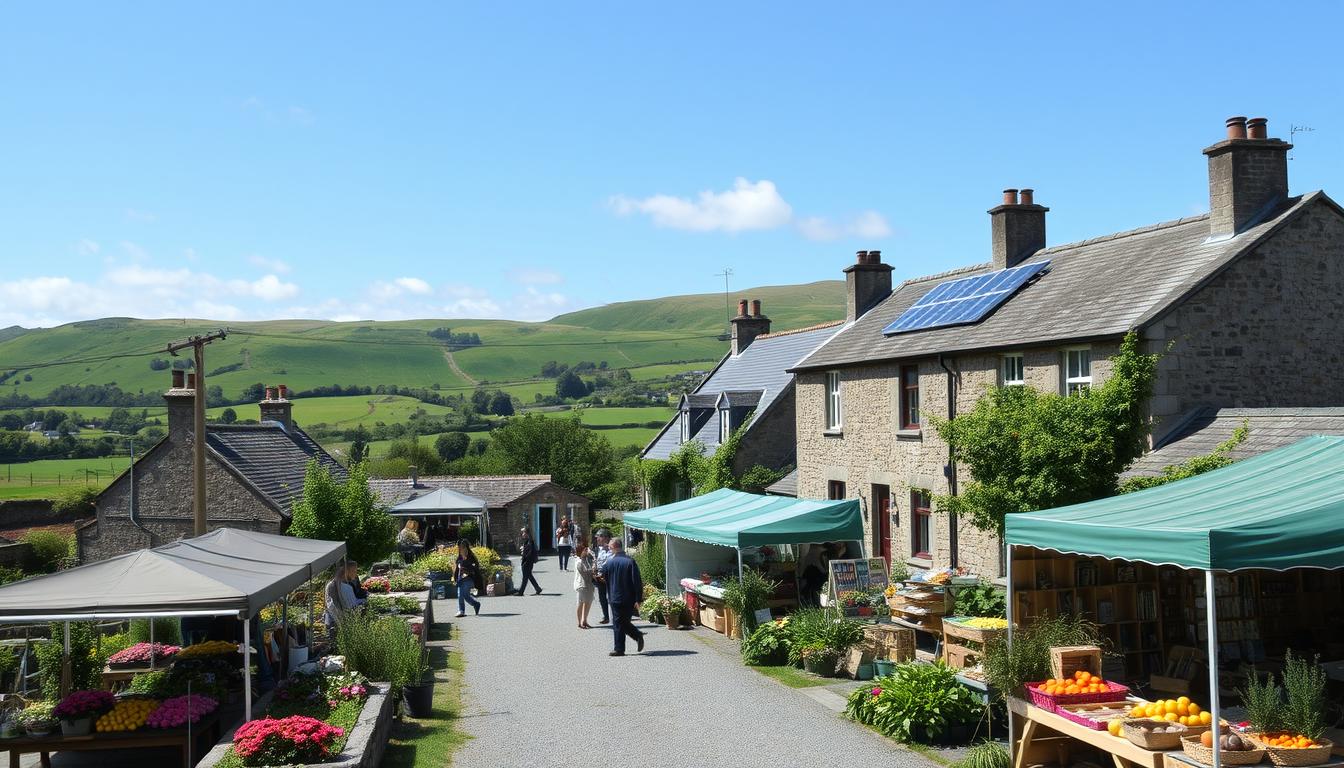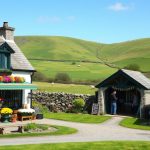The focus on sustainable economic growth is growing, especially for rural areas in Ireland. These areas face special challenges that need creative solutions. They must use local resources and talent to boost rural entrepreneurship and economic growth.
This article explores new chances in sectors like agriculture, tourism, renewable energy, and technology. It shows how these ideas can make rural areas thrive again.
The Importance of Innovation in Rural Ireland
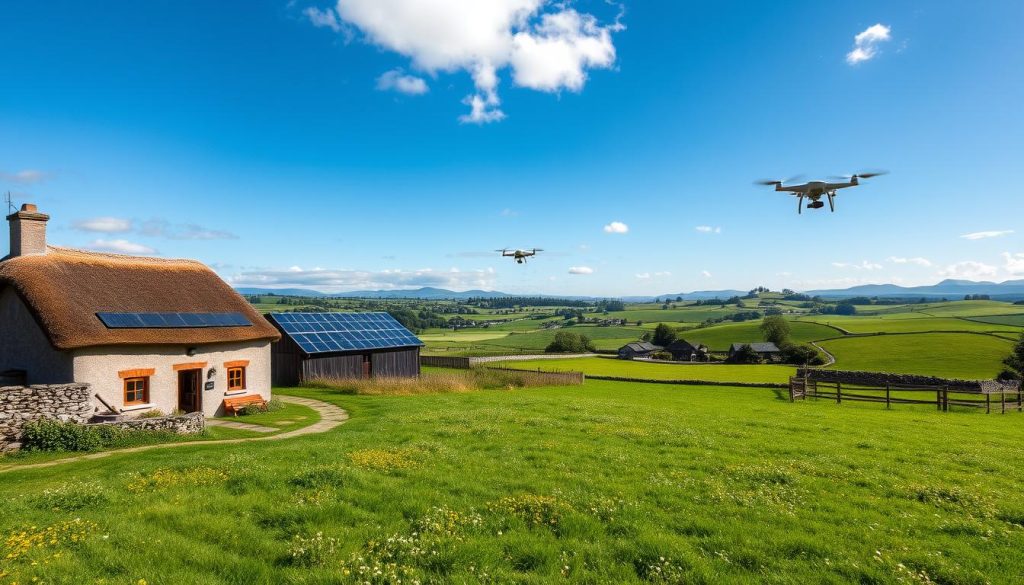
Innovation is key to boosting the economy and making rural Ireland sustainable. It brings new ideas to solve local problems and grab new chances. New technologies and ways of working can change old industries, making them better.
Figures from the Irish Government show how vital innovation is for rural areas. It helps create jobs, which is great for communities. When businesses innovate, they also make life better for people, helping communities stay strong even when things get tough.
Innovation is changing rural Ireland for the better. By focusing on new ideas and plans, areas can grow and improve life for everyone.
Identifying Opportunities in Rural Ireland
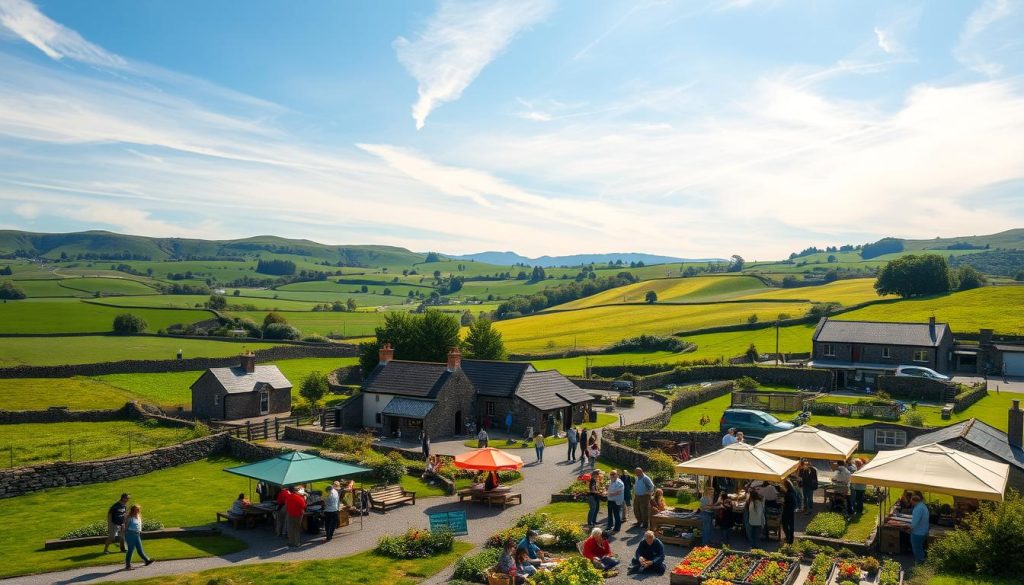
Entrepreneurs in rural Ireland have a lot of potential to discover. Understanding local demographics and community needs is key. A good market analysis can show where new services or products are needed.
Using tools like SWOT analysis helps entrepreneurs know their strengths and weaknesses. It also shows market opportunities and threats. Local surveys give insights into what people want and how they behave, helping guide business ideas.
Seeing what resources are already in the area is also important. This includes local talent and traditional crafts. Businesses that understand and value these can create something truly impactful and sustainable.
Innovative Business Ideas for Rural Areas in Ireland
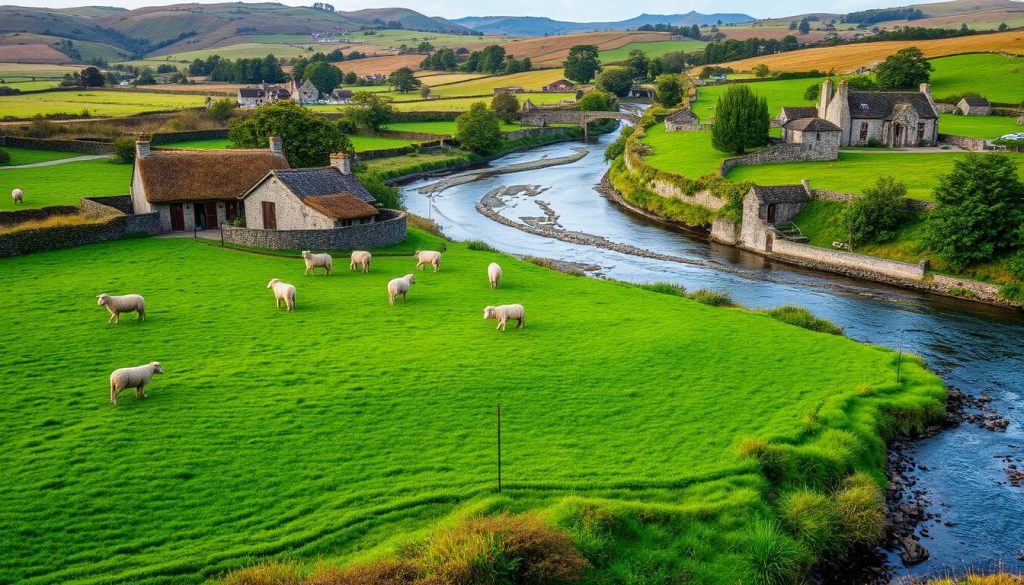
Using local resources in rural Ireland can boost community development. Entrepreneurs can start businesses that show off the area’s unique skills and products. This way, they create successful ventures that truly represent their surroundings.
Local Resources and Talent Utilisation
One smart move is to use local farming produce and the skills of local artisans. Starting businesses that use local ingredients is good for the planet and appeals to people who love real experiences. Some good ideas include:
- Artisan food products that use local flavours and methods.
- Craft workshops where local artists teach, creating jobs and keeping traditions alive.
- Platforms that connect farmers with buyers, making things more efficient and cutting down on waste.
Community Engagement and Development
Getting the community involved is key to coming up with new ideas. Co-operatives help locals work together, leading to projects that use everyone’s skills. In places like County Kerry, community efforts have shown great results. Some examples are:
- Marketing campaigns for products made by the community, helping them reach more people.
- Events where people can share their skills, helping everyone learn from each other.
- Sharing resources to save money and encourage more people to get involved.
Sustainable Agriculture Practices
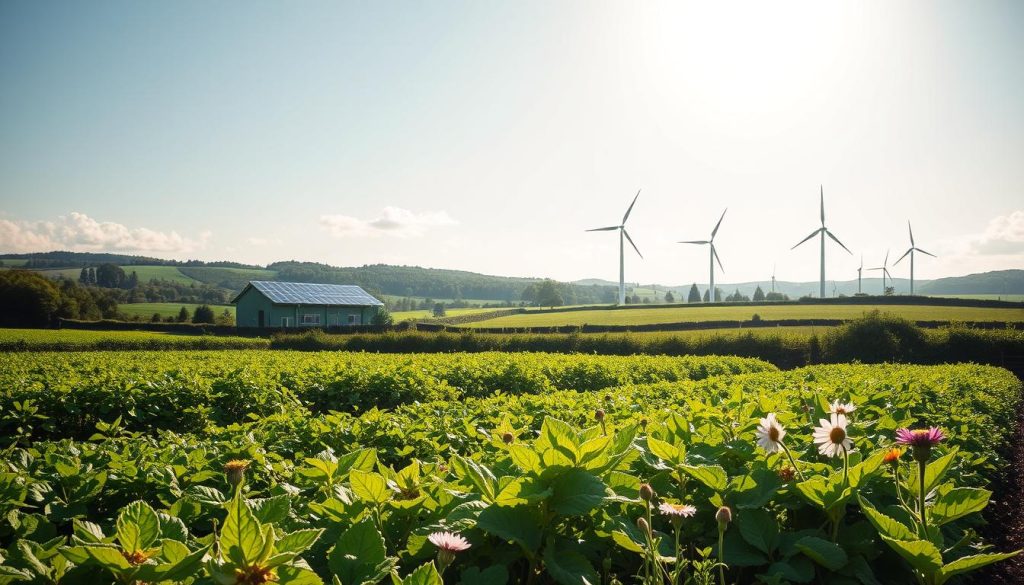
Sustainable agriculture is key for innovation in rural areas. It tackles environmental issues and uses local resources well. Vertical farming is a big part of this, allowing food to be grown in cities. This cuts down the environmental harm of old farming ways.
Vertical Farming Initiatives
Vertical farming stacks crops in layers or controlled spaces. It uses land better, letting farmers grow more in less space. With tech like hydroponics, farmers can grow veggies all year, using less water and no pesticides.
This approach helps rural areas play a big role in feeding cities. It’s a win for sustainable farming and for local communities.
Organic Produce Markets
More people want organic food for health and environmental reasons. This chance for local farmers to grow organic is big. By going organic, they meet demand and start new businesses.
Market trends show a big move towards organic. This makes organic farming a promising area for sustainable agriculture.
Renewable Energy Ventures
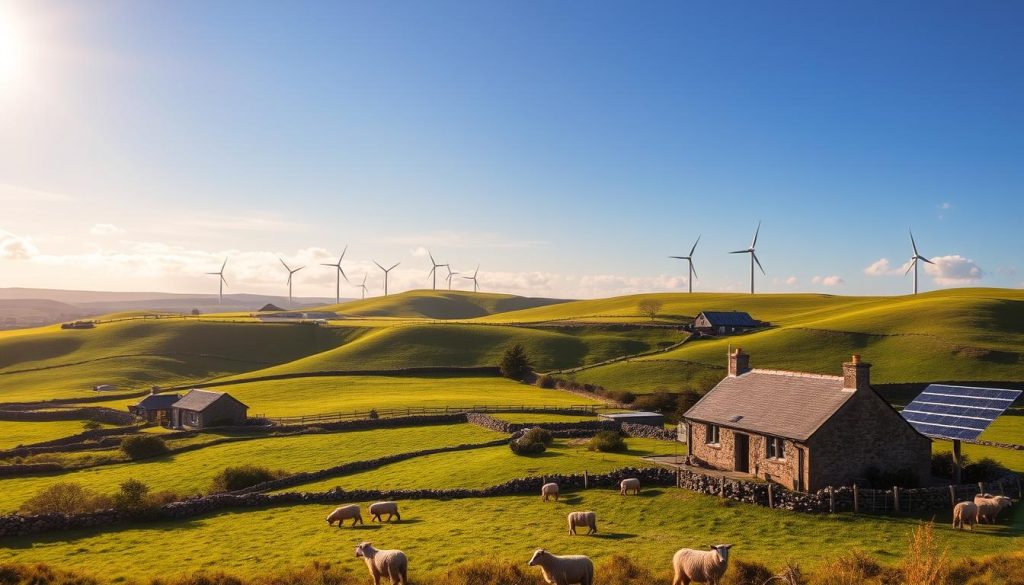
Rural Ireland is full of potential for renewable energy projects. The vast natural landscapes and commitment to sustainability make it ideal for solar, wind, and biomass projects. These projects help reduce carbon emissions and bring economic and environmental benefits.
Solar and Wind Energy Solutions
Solar energy is a great option for rural areas with lots of sunlight. Local farmers and businesses use solar panels to generate electricity. They can even sell extra energy to the grid.
Wind energy is also promising, especially in windy rural areas. Wind turbines can produce clean energy. Many projects show how these technologies change energy use in rural areas, helping sustainable development.
Community-Based Biomass Projects
Biomass projects are another way to use renewable energy in rural Ireland. They turn agricultural waste into energy, reducing waste and providing power. These projects create jobs and involve the community, showing the benefits of renewable energy.
Eco-Tourism as a Business Model
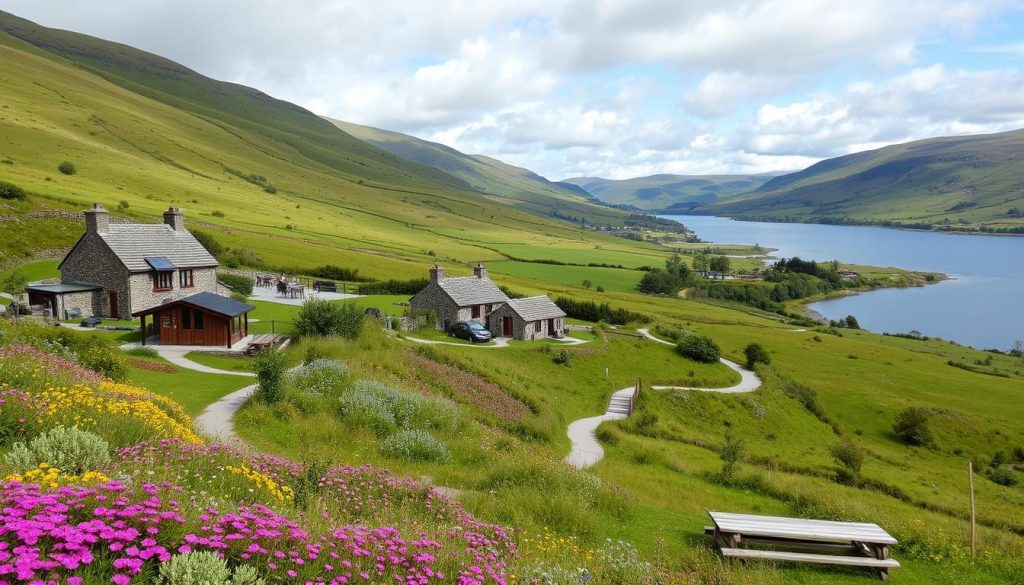
Eco-tourism in rural Ireland is changing the tourism game. It combines caring for the environment with helping local communities. This approach makes visitors appreciate nature, wildlife, and local culture more.
It also boosts the rural tourism industry. People want to travel in ways that are good for the planet. This means places can show off their natural beauty.
For example, birdwatching tours in Donegal and hiking on the Wild Atlantic Way are big hits. They not only bring in tourists but also teach them about protecting nature. Supporting local businesses and promoting eco-friendly travel makes eco-tourism in rural Ireland even more appealing.
Rural areas can thrive by focusing on caring for the environment and working with the community. This approach brings economic stability and helps keep local ecosystems and cultures alive. Eco-tourism is a great way to support both people and nature in rural Ireland.
Cultural and Heritage Tourism in Rural Settings
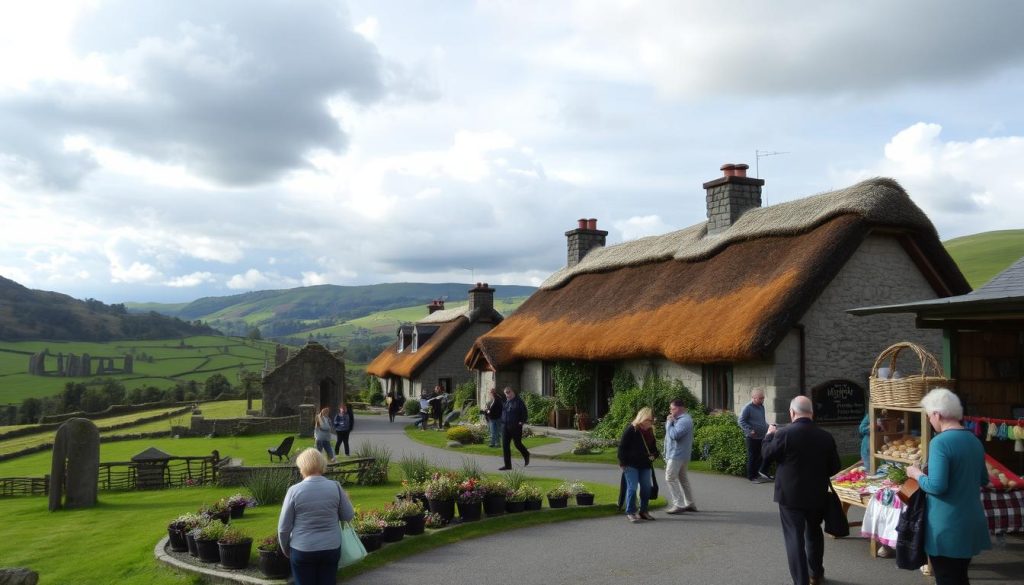
Cultural tourism is becoming more popular in rural Ireland. It shows off the area’s rich traditions and skills. Visitors want real experiences that connect them with local communities and their stories.
They enjoy learning from local artisans through interactive workshops. This is a great way to give tourists these special experiences.
Local Workshops and Crafting Experiences
Workshops led by skilled craftsmen let tourists learn old techniques. They can try:
- Hand weaving
- Pottery making
- Traditional painting
- Basket weaving
These activities help visitors understand Irish heritage better. They also help artisans keep their crafts alive and engage more with visitors.
Farm Stays and Agritourism
Farm stays are a big part of agritourism in Ireland. Tourists can really get into the farming life by:
- Joining in daily farming tasks
- Learning about green farming practices
- Tasting fresh food straight from the farm
These experiences help the local economy and give visitors unforgettable memories. They get a unique look into rural life.
Digital Connectivity and Remote Working

Remote work in rural areas is growing fast. Good digital connectivity is key. It lets rural businesses reach more customers and work better.
Technology makes communication, teamwork, and new ideas easy. This helps rural businesses grow and succeed.
Harnessing Technology for Rural Businesses
Technology helps rural businesses grow. It’s used for marketing, sales, and talking to customers. This opens up new ways to make money.
Cloud services make work easier. Data analysis helps businesses understand what customers want. This lets them stay ahead in the market.
Creating Coworking Spaces
Coworking spaces help freelancers and entrepreneurs in rural areas. They are places where people can work together and share ideas. This creates a lively business community.
Such spaces help everyone work better together. They make the business world in rural areas strong and successful.
Food Innovation and Artisan Products
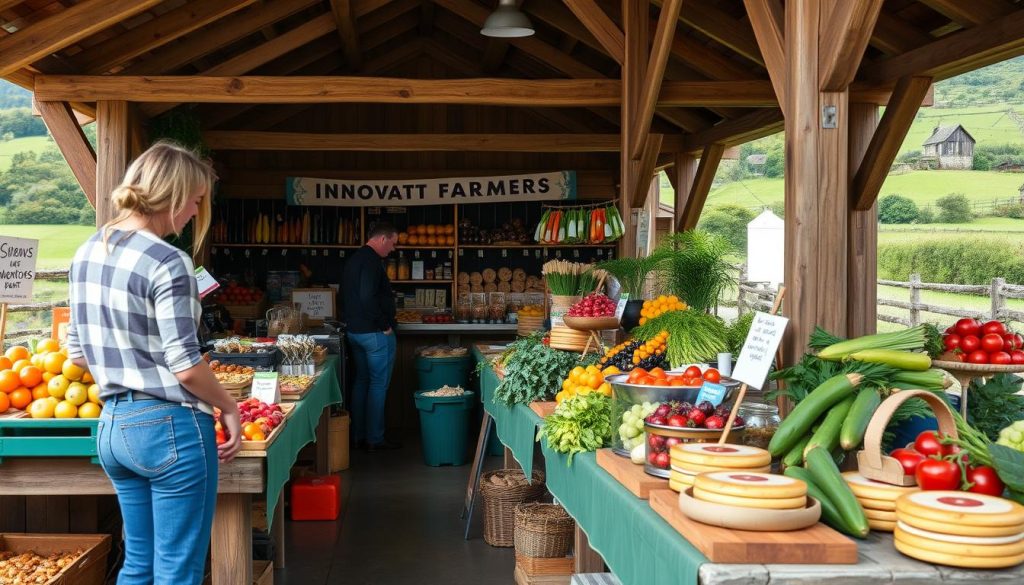
Food innovation is key in rural Ireland, creating a culture of quality and creativity. More people are getting into preserving food and making unique dishes. Workshops on food preserving and canning help local businesses connect with the community.
Food Preserving and Canning Workshops
These workshops teach both old and new ways of preserving food. They use local ingredients, bringing producers and consumers closer. The benefits are:
- Skill enhancement in preserving techniques
- Encouragement of sustainable food practices
- Promotion of artisan products in rural Ireland
Craft Brewery and Distillery Start-ups
Craft breweries and distilleries are adding to the food scene. Places like County Cork are seeing great success. Local brewers mix traditional recipes with new flavours. Supporting these start-ups boosts the local economy and offers a taste of rural Ireland. The effects are:
- Growth of local employment opportunities
- Attraction of tourism centred around food and drink
- Preservation of cultural heritage through unique beverage production
Health and Wellness Business Ideas
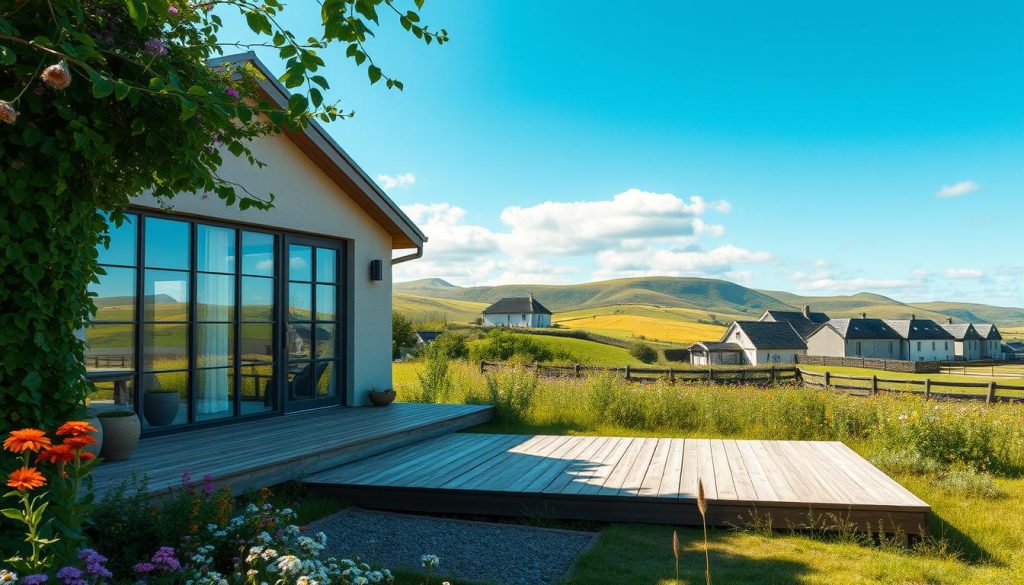
The health and wellness sector is booming, especially in rural areas. These places are known for their natural beauty and peace. Rural retreats are ideal for holistic health retreats, attracting those who want to relax and improve themselves.
Holistic Health Retreats
Holistic health retreats in rural areas aim to balance mind, body, and spirit. They offer yoga, meditation, and nutritional workshops. The calm landscapes of rural Ireland make these retreats a place for healing and relaxation.
Guests can enjoy nature, breathe in fresh air, and find peace. It’s a chance to connect with oneself and the environment.
Outdoor Adventure Activities
Rural areas are perfect for outdoor activities in Ireland. These activities, like hiking, kayaking, and cycling, boost physical health. They also help build a sense of community.
Guided tours can help local economies grow. They encourage an active lifestyle. These activities create strong bonds among participants, making the rural experience richer.
Creative Arts and Crafts Enterprises
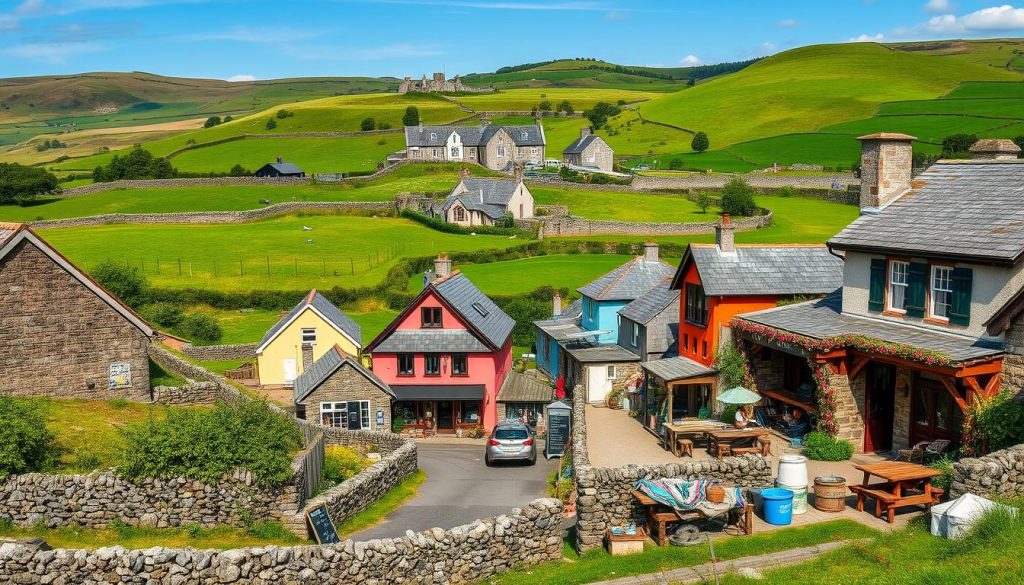
Creative enterprises in rural Ireland offer unique opportunities for growth. They help cultivate local artistic traditions. Entrepreneurs launching an arts and crafts business can create distinctive products.
These products celebrate the cultural heritage of their surroundings. This not only fosters community pride but also attracts tourism.
Support from local art groups and community centres is crucial. They help nurture emerging craftspeople. These collaborations encourage skill-sharing and workshops.
Workshops empower artisans to hone their craft and market their products effectively. As a result, rural areas can establish a vibrant arts scene. This scene serves both residents and visitors.
- Exhibitions showcasing local talent enhance visibility and attract tourists.
- Markets provide a direct avenue for artisans to sell their work, ensuring a sustainable income.
- Collaborative projects encourage knowledge exchange and foster innovation in design and technique.
Local Supply Chain and Food Hubs
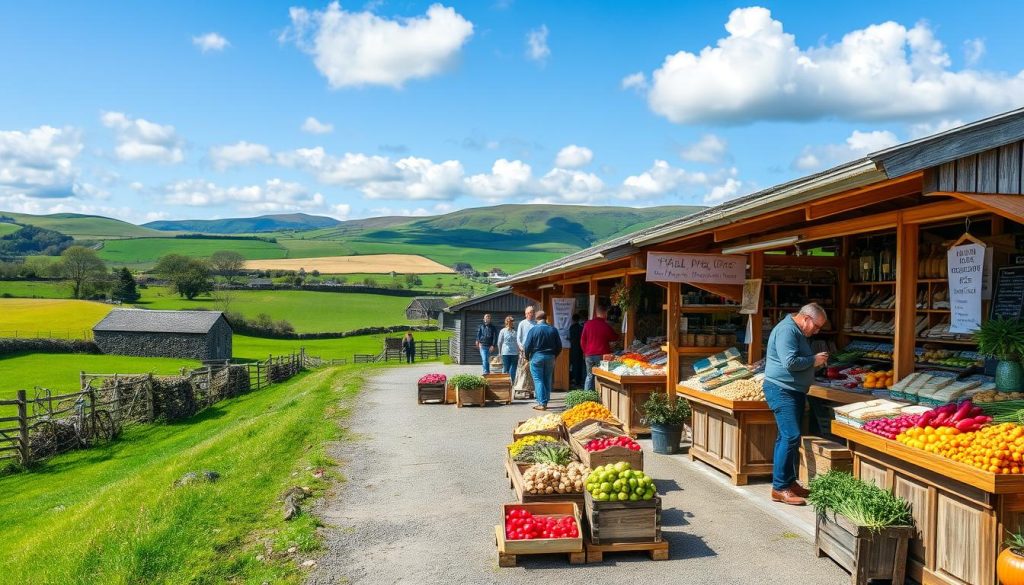
Creating local supply chains is key to making food systems in rural Ireland more sustainable. Food hubs in rural Ireland help connect producers directly with consumers. This approach ensures people get fresh, local food and cuts down on carbon emissions from long-distance transport.
Food hubs act as central points for local food gathering and distribution. They boost local economies. Communities adopting these hubs see a shift towards sustainable food values. Success stories highlight the positive changes these hubs bring to communities.
- Improved access to fresh produce for consumers.
- Support for local farmers and producers through direct sales.
- Strengthening of local economies and creation of new jobs.
- Promotion of sustainable food systems that focus on environmental protection.
Community-Based Educational Programs
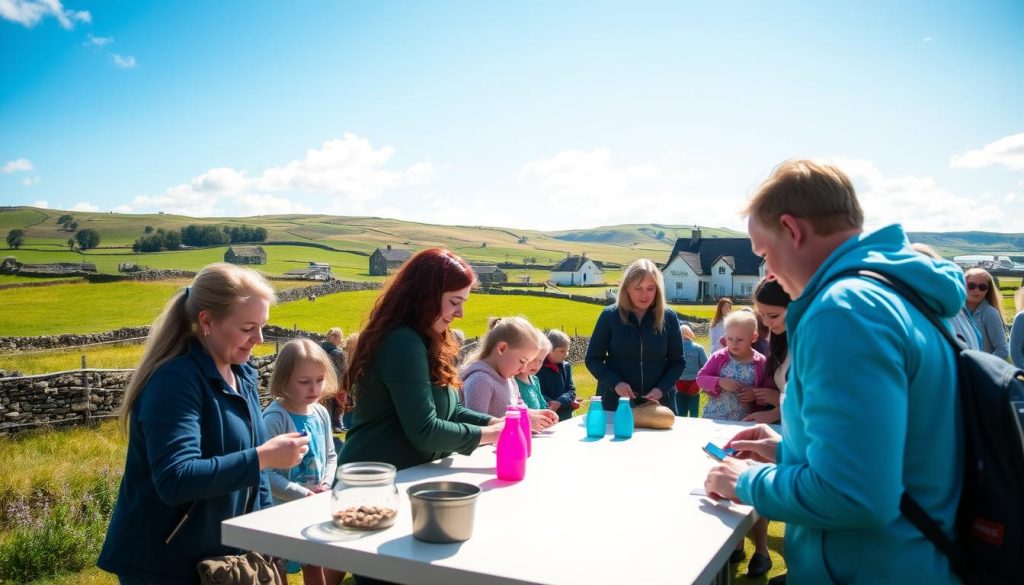
Community-based educational programmes in rural Ireland are crucial. They help improve skills and support business growth. These programmes give people the tools to start new businesses. They focus on practical skills to meet local needs and boost the economy.
Workshops for Skill Development
Skill development workshops are a big part of these programmes. They teach skills like digital literacy, business planning, and marketing. Local groups and schools help out, making resources better and community bonds stronger. People learn what they need to start their own businesses.
- Digital literacy training to navigate modern tools.
- Business planning workshops to create viable business models.
- Marketing strategies tailored for local products and services.
Leveraging Technology in Rural Businesses
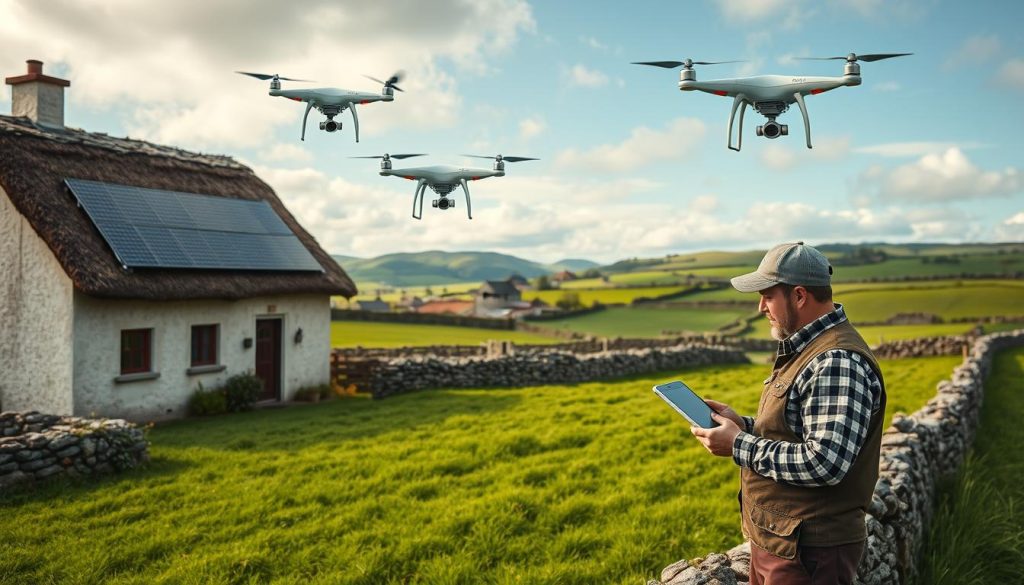
Technology is key for rural businesses to grow and stay strong. By embracing digital change, they can make their operations smoother and market better. This helps rural entrepreneurs build a strong online presence. They can then connect better with customers and reach wider markets.
To make the most of technology, rural entrepreneurs should follow these steps:
- Invest in online marketing tools to reach more people.
- Use social media to engage with the community and build the brand.
- Look into e-commerce to sell directly to customers.
- Take part in online training to boost digital skills.
Online courses can give rural entrepreneurs the skills they need for digital success. By being proactive with technology, they can keep their businesses competitive in a changing world.
Government Support and Funding for Rural Innovation
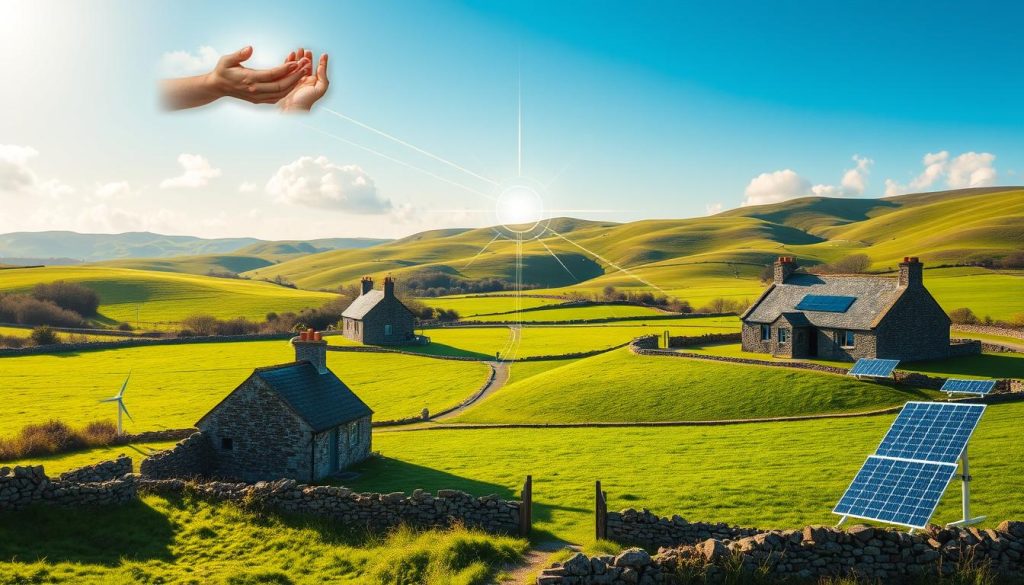
Government support in rural Ireland is key to boosting innovation and entrepreneurship. Initiatives like LEADER and the Rural Development Programme offer vital funding. This can greatly help local economies.
Grants and tax incentives are also available to encourage investments in rural projects. These resources are significant but require entrepreneurs to be well-informed. Knowing how to access this funding can help local businesses grow.
It’s important to know about government support to make the most of it. Local outreach and education can help entrepreneurs understand funding options. This ensures innovative ideas get the support they need to flourish.
Networking and Collaboration Among Rural Entrepreneurs
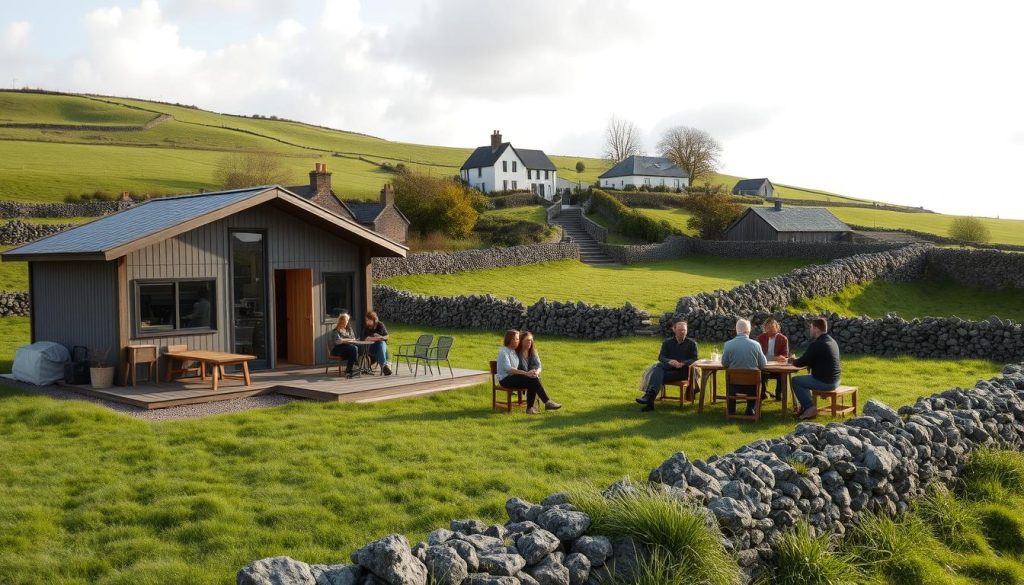
Networking is key in rural business. It helps entrepreneurs work together. They share knowledge and resources, making their businesses stronger. This teamwork leads to new ideas and helps the local economy grow.
Building Supportive Business Communities
Strong business communities need local entrepreneurs to work together. Here are some ways to do it:
- Organising regular meet-ups and networking events.
- Creating online platforms for collaboration.
- Facilitating knowledge-sharing sessions to discuss challenges and successes.
These steps help local businesses grow together. They build a community spirit that’s vital for success.
Mentorship Programmes
Mentorship is another great way to help rural businesses grow. Experienced entrepreneurs guide newcomers. This helps them learn how to run a business.
- Access to industry insights and best practices.
- Enhanced skills through tailored coaching.
- Opportunities to network with other professionals in the field.
Mentorship programmes are crucial for rural areas. They help new entrepreneurs grow, leading to a strong business community.
Success Stories of Innovative Rural Businesses
Rural Ireland has seen a big change thanks to new businesses. Kilkenny’s Eco Milk is a great example. It uses green farming to make organic dairy for local shops. This shows how old farming can meet new ideas, winning over customers who want quality and care for the planet.
The eco-tourism sector is also growing fast. Places like Connemara Adventure Park show off the area’s beauty and culture. They offer special experiences that help keep local traditions alive. This shows how new ideas can help grow the economy and bring people together.
Artisan food makers, like Clonakilty Food Company, are also doing well. They mix local ingredients with new cooking methods. Their success shows how fresh takes on old recipes can make local brands famous. These stories inspire others to start their own businesses in the countryside.

